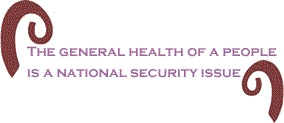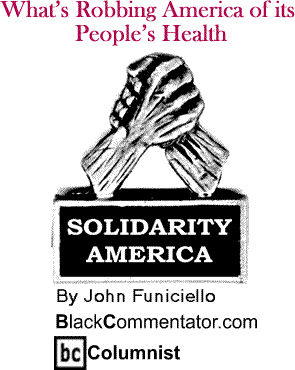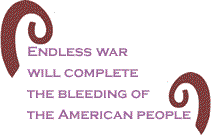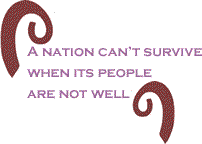
|
||||||||||||||||||||||
|
|
||
 |
||
One of the great tragedies of the past year is the failure of our national leaders to take care of old business that should have been addressed a half-century ago - health care for all.
The general health of a people
is a national security issue and our national health doesn�t measure
up to that of other so-called developed countries. It doesn�t even
measure up to some �developing� countries or what used to be called
the There has been speculation that, if there were not a health-care-for-all program, beginning with the inauguration of Barack Obama as president, there might not be one for another generation or two. After all, when he was a mere senator, President Obama expressed strong support for universal health care. He thought single-payer universal health care was a good idea. Then he was inaugurated and began to see who runs the country and all of its various parts. He began to see the wisdom of further pursuing our military adventures in the Middle East, even after he had said that we would leave Iraq (in due time), close Guantanamo prison in Cuba, and change the way we approach foreign policy. What he didn�t say was that
we would leave There is little that is reported
about the actual numbers of American troops and mercenaries in
All of that costs money and
empires have a way of extracting that money from its own citizens
because, often, the people of the countries conquered don�t have
the financial wherewithal to pay taxes. What they pay with is their
natural resources and they don�t much benefit from their exploitation.
Just have a look at the condition of the people of According to the Census Bureau,
last September, about 39.8 million Americans were living in poverty,
up from 37.3 million in 2007. The prediction was that the poverty
rate would increase in 2010 and that the unemployment rate would
stay high, despite claims that the country is coming out of the
Great Recession. Poverty is defined by the Anyone trying to raise a family on any paycheck knows how difficult it is to make ends meet and to eat a few times a day. At the poverty end of the pay scale, three meals a day is out of the question. With continued job losses and downsizing of businesses, with continued shipping of production out of the country, the prospect of a full recovery is bleak. A full recovery would include a job for anyone who wants one. And those jobs would have to be well-paying. Right now, there are six job-seekers for every job opening and it looks as if it will stay that way for some time. The ripple effect is, and will be, profound. Schools are cutting teachers, kids have bigger classes, the �frills� such as art, music, and sports are being cut. Some schools are closing and considering mergers. The effects on local communities are just as profound and public services will be affected: road and street maintenance, water systems, sewage treatment, public health services. State and local governments are in or are nearing bankruptcy. Citizens are reaching the end of their capacity to pay more taxes. We�re reaching a time in which the military-industrial complex will have drained just about as much as it can, while leaving a whisper of life in the country. President Eisenhower warned of the growing power of the military machine in his farewell speech to the people in 1961. No stranger to war and the machinery of war and the philosophies of those who pursue war for their own ends, he nonetheless warned: ��This conjunction of an immense military establishment and a large arms industry is new in the American experience. The total influence - economic, political, even spiritual - is felt in every city, every statehouse, every office of the federal government. We recognize the imperative need for this development. Yet we must not fail to comprehend its grave implications. Our toil, resources and livelihood are all involved; so is the very structure of our society�� Eisenhower also pointed out
that ��we annually spend on military security more than the net
income of all
Wars in the Endless war and the prospect
of endless war will complete the bleeding of the American people
and the A great threat to our stability is the general ill-health of the American people. As a nation, we can not casually note that 50 million do not have access to health care and perhaps an equal amount do not have adequate health care. A nation can�t survive when its people are not well. This is a strange time, when an international criminal can call the tune and nations dance. Of course, it helps if the tune called is the one that nations want to dance to, and that seems to be the case with the �war on terror.� It�s a convenient appellation and it means that anyone can be considered a �terrorist,� worthy of being the object of a new �war.� These are not nations or states. They�re criminals, but they can cause a nation to launch a new war against a gang or a single individual and call it warfare. That is, unless a handy nation can be found to blame for harboring such criminals. In that case, a more conventional war can be launched. In his farewell address, Eisenhower
seemed to be anticipating the kind of government and political system
that exist in the ��Another factor in maintaining balance involves the element of time,� he said. �As we peer into society�s future, we - you and I, and our government - must avoid the impulse to live only for today, plundering, for our own ease and convenience, the precious resources of tomorrow. �We cannot mortgage the material assets of our grandchildren without asking the loss also of their political and spiritual heritage. We want democracy to survive for all generations to come, not to become the insolvent phantom of tomorrow.� Millions of the children of whom he spoke live today in poverty, without the prospect of a proper education, without wholesome food, and without the health care that they need to become full and active citizens.
BlackCommentator.com
Columnist, John Funiciello, is a labor organizer and former union
organizer. His union work started when he became a local president
of The Newspaper Guild in the early 1970s. He was a reporter for
14 years for newspapers in |
||
 |
||
If you would like to comment on this article, please do so below. There is a 400 character limit. You do not need a FaceBook account. Your comment will be posted here on BC instantly. Thanks. Entering your email address is not mandatory. You may also choose to enter only your first name and your location.
|
||
Thank you very much for your readership. |
||
| Any BlackCommentator.com article may be re-printed so long as it is re-printed in its entirety and full credit given to the author and www.BlackCommentator.com. If the re-print is on the Internet we additionally request a link back to the original piece on our Website. | ||
| |
||
Issue 363 |
| Executive Editor: Bill Fletcher, Jr. |
| Managing Editor: Nancy Littlefield |
| Publisher: Peter Gamble |
| Est. April 5, 2002 |
| Printer Friendly Version in resizeable plain text format |
 |
 |
 |

|
 |
| |
| |


































 America
America
 That
was a lot of money, but today, the Pentagon and military spending
account for half of the world�s total military spending. By contrast,
That
was a lot of money, but today, the Pentagon and military spending
account for half of the world�s total military spending. By contrast,
 The
ill-health of
The
ill-health of 








